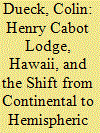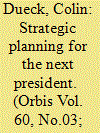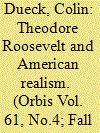|
|
|
Sort Order |
|
|
|
Items / Page
|
|
|
|
|
|
|
| Srl | Item |
| 1 |
ID:
188133


|
|
|
|
|
| Summary/Abstract |
Over the course of the 1890s, the United States shifted from a continental defense model toward a hemispheric one. Senator Henry Cabot Lodge (R-MA) was a leading proponent of this shift. Lodge was convinced that the United States needed to build a blue-water navy, acquire maritime bases overseas, establish its predominance in Central America, and push US influence out into the Pacific. The first test of this vision came not against Spain or Germany in the Caribbean, but against the possibility of British and Japanese influence over Hawaii in 1894–95. Domestic political and economic considerations acted mainly as a constraint on Lodge’s vision rather than as a basis for it. The main impetus was strategic, as he looked to safeguard an extended security zone for the United States in Atlantic, Pacific, and Caribbean waters. As he put it, “I would take and hold the outworks, as we now hold the citadel, of American power.”
|
|
|
|
|
|
|
|
|
|
|
|
|
|
|
|
| 2 |
ID:
148071


|
|
|
|
|
| Summary/Abstract |
This article contends that during the Republican administrations of the 1920s, U.S. officials pursued no deliberate strategy of offshore balancing. On the contrary, Washington hoped to transcend the necessity for balance of power policies altogether through developing a new, demilitarized and economically interdependent world order. The strategy was certainly offshore, in the sense of avoiding alliance commitments, but it did not involve great power balancing. Instead, it combined a business orientation, deep aversion to the use of force, and a profound optimism in the inevitability of peaceful international progress.
|
|
|
|
|
|
|
|
|
|
|
|
|
|
|
|
| 3 |
ID:
101206


|
|
|
|
|
| Publication |
2011.
|
| Summary/Abstract |
The United States has never followed only one grand strategy at a time. In this article, I develop the concept of "hybrid" grand strategies-strategies that vary by time and place, and combine the advantages (or disadvantages) of pure strategic archetypes such as containment, integration, regime change, bargaining, or non-intervention. I argue that hybrid strategies have been ubiquitous in American history, varying more by emphasis and degree than by absolute contrast. Moreover, U.S. hybrid strategies have often succeeded in accomplishing their major goals.
|
|
|
|
|
|
|
|
|
|
|
|
|
|
|
|
| 4 |
ID:
057761


|
|
|
| 5 |
ID:
078136


|
|
|
| 6 |
ID:
052056


|
|
|
| 7 |
ID:
075255


|
|
|
|
|
| Publication |
2006.
|
| Summary/Abstract |
The Republicans’ loss is not necessarily the Democrats’ gain.
|
|
|
|
|
|
|
|
|
|
|
|
|
|
|
|
| 8 |
ID:
069876


|
|
|
|
|
| Publication |
2005.
|
| Summary/Abstract |
When and why do states adopt new grand strategies? According to a "neoclassical realist" model, changes in international conditions are the chief cause of long-term adjustments in grand strategy, while domestic political-military cultures help specify the precise grand strategies chosen by state officials. What results are outcomes that appear surprising or skewed from a realist perspective. I test the neoclassical realist model against the cases of u.s. strategic adjustment in 1918-1921 as well as 1945-1948 and find that the long-term trajectory of America's rise to world power is best explained by international pressures. The precise strategies chosen in each period, however, were heavily influenced by American political-military culture. The implication is that theoretically inclusive forms of realism can provide convincing explanations for changes in grand strategy; furthermore, states can remain somewhat "differentiated" in terms of their foreign policy behavior, for cultural reasons, and in spite of international pressures to the contrary
|
|
|
|
|
|
|
|
|
|
|
|
|
|
|
|
| 9 |
ID:
126758


|
|
|
|
|
| Publication |
2013.
|
| Summary/Abstract |
According to the honest broker model, when national security advisors press for specific policy outcomes, they compromise their ability to focus on improving the quality of the decision- making process. That model is tested here in the case of the 2006 Iraq Strategy Review. It found that national security advisor Stephen Hadley was able to act as honest broker, and that this did in fact improve the quality of the decision process. At the same time, he was able to act as a policy entrepreneur, connecting existing problems to alternative policy ideas. Consequently the two roles were not incompatible. Moreover, he was able to do both primarily because he acted as a credible agent of the president. The implication is that the national security advisor must be first and foremost an effective presidential agent, if he or she is to play any constructive role-including that of honest broker.
|
|
|
|
|
|
|
|
|
|
|
|
|
|
|
|
| 10 |
ID:
148080


|
|
|
|
|
| Summary/Abstract |
The next President inevitably will face difficult tradeoffs in U.S. foreign policy. Trying to split the difference between opposing policy positions can present serious risks. The presentation of real choices to the chief executive is central to his or her authority. A President should be made aware of the options. Then it is up to him or her to decide. The author contends that strategic planning can help, and concludes with six specific recommendations for NSC reform.
|
|
|
|
|
|
|
|
|
|
|
|
|
|
|
|
| 11 |
ID:
068655


|
|
|
| 12 |
ID:
155287


|
|
|
|
|
| Summary/Abstract |
Theodore Roosevelt’s foreign policy as president was animated by a desire to see the United States play a leading role in world affairs. He utilized skillful diplomacy, energetic executive action, and credible naval capabilities to support this forward role, while avoiding strategic overextension. In Latin America, Roosevelt looked to forestall European intervention and secure U.S. predominance. In Europe and East Asia, he sought to promote regional balances of power, while working under strict constraints imposed by Congress and U.S. public opinion. In the end, Roosevelt navigated these constraints as well as international events with considerable success. His presidential tenure is a good example of American foreign policy realism in action.
|
|
|
|
|
|
|
|
|
|
|
|
|
|
|
|
|
|
|
|
|